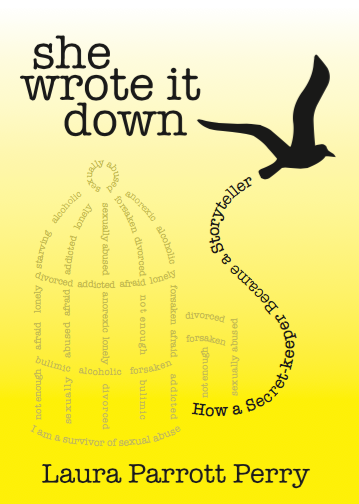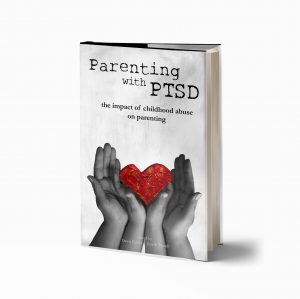We are so honored to share the introduction to Laura Parrott Perry’s new book “She Wrote it Down”. Laura is a brave truther teller. She is the co-founder and CEO of Say It, Survivor; a non-profit committed to helping survivors of childhood sexual abuse reclaim their stories. With this book she is continuing her mission to break the silence and in doing so, give permission to others to own their stories and break free from the cage of shame.

INTRODUCTION
“What would happen if one woman told the truth about her life?
The world would split open.”
Muriel Rukeyser
Public speaking used to terrify me. In order to stand in front of people and talk I needed to have planned out and memorized exactly what I was going to say. My heart would pound and my knees would buckle. I’d inhale unsteadily and race through what I needed to say. I’d find myself short of breath by the end.
I had to glaze my eyes over or look at some fixed point so I wasn’t looking at people’s faces. It was pure performance and I would intentionally disconnect from the audience in order to maintain my composure. It’s tricky to be on stage and not be seen, but I’m pretty sure I pulled it off.
These days, I frequently find myself speaking in front of crowds. Sometimes it’s on a large stage and sometimes it’s in a tent at a festival. Sometimes it’s in a circle of busted up folding chairs in a church basement.
My opening might vary a bit, depending on why I’ve been invited, but it is nearly always some version of the following:
Hi! My name is Laura Parrott Perry and I am a survivor of child sexual abuse. I’m also a recovering alcoholic, anorexic, and bulimic. I’ve basically got all your ‘icks’ covered.
I’m great at parties. Honest.
This guacamole’s fabulous! Wanna talk trauma history?
I don’t lead with those facts for the shock value or because they are the most important things about me or the most interesting. They’re not. They are also no longer the way I define myself. I’m a woman, a mother, a writer, an activist, and an artist.
I lead with those particular facts for two reasons: First, I know the statistics for all those identifiers. When I scan the room, I immediately do the math. If I have a group of a hundred people, I know the numbers tell me that there are likely upwards of twenty survivors of sexual abuse, ten or more people who struggle with substance abuse, and at least three with disordered eating. Within that particular set of statistics there is an awful lot of overlap – I am living proof.
We all feel alone in those things. It’s in the very nature of those struggles to believe it’s just you, so it is always my intention to have as little time as possible pass between when I start talking and other people stop feeling alone in their pain.
Second, those stories were my shame stories and I have learned at long last and at great cost that shame needs to be dragged into the light. Shame requires the darkness of secrecy the way flowers require sunlight. It feeds on it.
Every time I give voice to those stories their grip on me lessens. Every time I tell what happened shamelessly, I take back control of my own narrative.
I have learned that for me, shame is like kryptonite. It was utterly destructive, a boot on my neck for most of my life. It is powerful and treacherous, and it is a luxury I cannot afford.
Our stories hold immeasurable power – all of them, whether they’re narratives of triumph or shame. Our shame stories, though, wield power differently in the darkness and the light. When we are vulnerable and share those stories, we create a safe space for others to do the same. Those stories form connection and community. Our shared stories of pain help us to identify with one another and to feel less alone in the world. Our untold shame stories have prodigious power, too.
Let’s imagine a museum for a minute. What would we think of an exhibit kept cordoned off and hidden away? What would we make of something set behind velvet ropes and under special dim lighting, that few, if any, people were allowed to go back and witness? And what if those who were granted access had to pass all kinds of litmus tests, wear special gloves, and promise never speak of what they saw? What would we think of that exhibit compared to, say, one open to the general public?
I imagine we’d assume it was a pretty valuable exhibit, right? And if that was the ONLY artifact treated that way? The only relic locked away from prying eyes, the only piece afforded that much secrecy and security? One would naturally assume it to be the most valuable treasure of the whole lot.
Now imagine that your life is the museum and your stories are the exhibits.
When we treat our shame stories that way, when we hide them away, we assign them greater value. We treat them as though they are precious. Our refusal to give voice to our shame stories renders them more valuable, more powerful than our stories of love, redemption, and triumph.
When my stories went underground, when I guarded them closely, I made them dark treasures. I was constantly vigilant against encroachment on my secrets – if anyone got too close or pried too much I would double the security. I’d pull away. I’d lie. I’d perform.
I thought if I made myself invaluable, if I was good enough, or did enough, or gave enough – proved myself an essential asset, somehow – it would offset the shadowy deficit column of my shame stories. It never worked though. I always came up short. The scales were never balanced.
When I think about that it reminds me of the show Shark Tank. You know, when some young entrepreneur comes in and asks for $500K for 2% of his brand new company that has earned all of $132 dollars, and the Sharks blanch and say, Your valuation is insane. How did you come up with that? Your company is not worth that much. My valuation of my shame stories was insane, but because they were secrets I’d never allowed anyone to check my math.
When you have something that valuable, something that requires so much protection, your entire life is in service to its care and concealment. When my stories were hidden away, they were in charge of my whole life. I am a firm believer if your story is going untold to anyone, anywhere, that’s not privacy, that’s secrecy. Privacy and secrecy are not the same things.
Not every story needs to be told to everyone, not every fact of your life needs to be dragged into public. There’s a difference, though, between choosing not to tell a particular story in a particular forum, and believing your story is unspeakable. The difference between privacy and secrecy is shame.
If you have a story that is hidden away, that you are unwilling or unable to share in any way, with anyone, anywhere, then it is the most powerful chapter in the story of your life. And the thing about shame is this: it is singularly malignant. And, like all good cancers, it does not stay contained. It metastasizes. It spreads. It conquers.
Our stories are insistent – they demand to be told. If you do not tell your story it will find a way to tell itself. Believe it.
If I reflect on the chapters in my life when I have been in despair, when I’ve suffered and struggled the most, there was a common denominator: a shame story that was going untold. Shame begets secrecy begets harmful coping behavior begets more shame: a toxic, hopeless spiral.
I spent forty-four years keeping secrets of one kind or another. All shame stories. Decades of hiding and lying and hustling lead me to a place of profound brokenness. I heard Rob Bell define despair as the belief that tomorrow will be exactly like today. That resonated deeply with me. When I hit rock bottom that’s exactly how I felt. This can never change, and also, I cannot do this for one more day.
Because I’d deemed my stories unspeakable, I felt stuck, paralyzed. Our untold stories are static. They’re not open to challenge, they can’t be re-framed, they cannot be re-written.
My shame stories were a prison with an open door. I sat inside my shame, believing it was a dark, impenetrable fortress when all I needed to do was stand up and walk into the sunlight.

About the Author
Laura Parrott Perry is a survivor of childhood sexual abuse, and a recovering alcoholic, anorexic, and bulimic. She is the author of the popular eponymously named blog (formerly known as In Others’ Words) and The Golden Repair on DivorcedMoms.com. Her work has been featured on The Huffington Post, in Boston Magazine, on Trigger Points Anthology, and No Make-Up Required. Laura is a frequent public speaker on the topics of shame, trauma, addiction, and story. She has been a contributor at The Wild Goose Festival and a guest on numerous podcasts, including Poema, Spiritual Charlotte, The Practical Minimalists, The Grass Gets Greener, The Good Word, and A Wish Come Clear’s ‘You Need to Read’ series. She is co-founder and CEO of Say It, Survivor; a non-profit committed to helping survivors of childhood sexual abuse reclaim their stories.
About the Book
We live inside our stories, we make homes of them. When our stories become secrets, those homes become prisons. If you have a story you are not telling anyone, anywhere, in any way – that is not privacy, it’s secrecy. The difference between privacy and secrecy is simple: Shame. A lifelong secret-keeper, Laura Parrott Perry began the process of transforming into a storyteller when the dark secrets she’d been carrying around became too heavy and her life began to collapse under the weight of them. Sexual abuse, eating disorders, alcohol, perfectionism… Those secrets were all her story making itself known when she was unwilling to tell it. Bit by bit, story by story, the author began to shine a light into all those dark corners and tell the truth. She surrendered to the facts of her life and her past, and in doing so began to write a beautiful new future.
Purchase She Wrote it Down on Amazon here: http://amzn.to/2nn4KSV
